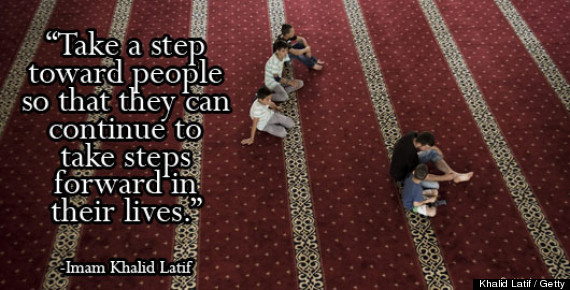Imam Khalid Latif is blogging his reflections during the month of Ramadan for the fourth year in a row, featured daily on HuffPost Religion. For a complete record of his previous posts, visit his author page, and to follow along with the rest of his reflections, sign up for an author email alert above, visit his Facebook page or follow him on Twitter.
A young man came to see me recently to discuss a personal matter in his life. In the privacy of my office he opened up to me about being sexually abused. He spoke about the circumstances, the abuser, and other details just as numerous other people had done before him while sitting in the same chair. What made this conversation different was his actual dilemma. He wasn't bothered by the experience necessarily, and that is what was bothering him. He thought something was wrong because nothing was wrong.
The Muslim community hasn't always been the best about dealing with real-life experiences, including issues relevant to mental health. In the United States at least, aside from a masjid in most cities, there is an absence of other much-needed organizations and social services. Mental health and counseling have been taboo at best for many years and now as people start to discuss these topics more, one adverse consequence is many in our community being more confused about what they are supposed to do with the information they are hearing and how it is supposed to fit into their lives.
Self-confidence and self-esteem are not the most prevalent characteristics amongst Muslims, especially in comparison to the high level of insecurity that exists as a byproduct of a very black-and-white, legalistic approach to Islam, devoid of any semblance of pastoral care. When complemented by the lack of professional and trained life-coaching and mental health resources in the community and the prevalence of those who are forced or pretend to be those resources, information becomes hard to process. The young man who came to see me believed that there was something wrong with him because he wasn't feeling impacted by his abuse. He had attended a few panels and khutbahs at our Islamic Center at NYU that dealt with the topic. He was privy to conversations with friends and peers which lead him to believe he needed to reevaluate the experience because it wasn't seemingly holding him back. It also lead me to believe that I needed to be smarter about how these were being talked about. The information was thrown at him and he then had to figure out what to do with it. That's not necessarily fair.
"Whosoever believes in God and the Last Day, let him speak good or be silent." ~ The Prophet Muhammad, peace and blessings be upon him.
As people start to talk about depression, anxiety, grief, abuse, and a gamut of other topics more in contrast to the little discourse that took place before, it's important to reflect on who is talking about those topics as well as how they are talking about them. I've sat and listened to a large number of people who tell me about a friend or family member going through a tough time in life. They then say that the person is depressed when in reality they aren't. The problem here is three-fold.
- One, If you get into someone's head that there is something going on with them, like depression, when in fact they are not depressed, they are going to probably still believe that they are depressed. In most instances, they will go to the most easily accessible resource, the internet, read up on articles and find clinical definitions that will cause them to deepen their confusion. You, on the other hand, are totally unbothered and unaware of the impact your words had.
- Secondly, you fail to recognize and build real resources for those who are actually going through certain things, again like depression, because you are misusing terms and don't know what they actually mean. The same can be said about a variety of conditions. Again, that's not really fair.
- What this also brings light to, in my opinion, is our own unwillingness to really help others, both as individuals and as a community. "Maybe you need to go speak to someone professionally," can easily turn into a deflection of our responsibility to the people around us. By no means am I saying that there aren't people who are going through a variety of situations that necessitate seeing a counselor or therapist. But there are also many who are just feeling a certain emptiness, a hollow void stemming from a lack of purpose or belonging, that just need someone to walk through life with them. They need us to walk with them. They need you to walk with them.
In Ramadan you're going to find a lot of people who are coming to terms with certain things about themselves. In order to move forward, they will be taking on obstacles that have existed within themselves for years but they're only starting to see now. You don't have to be their adviser or counselor. You don't even have to be their friend. You just have to be there. Take a step toward them so that they can continue to take steps forward in their lives.
"Never give up on someone with a mental illness. When "I" is replaced by "We," illness becomes wellness." ~ Shannon Adler
So true. The only piece that is missing is you.
